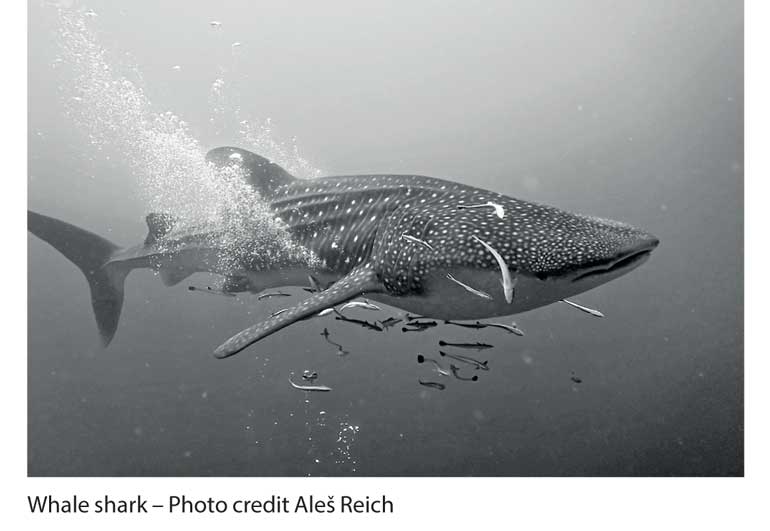Tuesday Feb 17, 2026
Tuesday Feb 17, 2026
Wednesday, 7 June 2017 00:00 - - {{hitsCtrl.values.hits}}

 By Francoise Jacob
By Francoise Jacob
A couple of months ago, while underwater just a few miles off the coast of Colombo, I had a chance encounter with an extraordinary being. As we meandered in and out of a coral-covered wreck, this gigantic creature appeared from the dark depth, a massive whale shark with dozens of little fish swimming gracefully by its side, like a king moving with his court.
The shark stayed with us for almost 40 minutes. He kept circling us, coming closer and closer, shifting on its side to watch us, seemingly loving the attention, the bubbles and all the camera work going on around him. Eventually we had to leave it because of our own body’s limitations to sustain such depth.
At some point, the shark and us got swallowed in a huge and swirling school of small yellow fish, abundant and joyful. Honestly, this was one of the most overwhelming moments I have experienced in a long time. I was crying in my mask, and I was not the only one. The diver next to me was just as emotional.
Most of us, the seven billion humans, actually never see what is underwater. No wonder we don’t care enough about it, despite the fact that life began in the seas, and the planet is sustained by the oceans. We forget that climate and weather systems depend on the temperature patterns of the ocean and its interactions with the atmosphere. We ignore that oceans absorb carbon dioxide, and as we emit more, the oceans also absorb more. This results in acidification of the waters, which in turn, damages different types of life. We vaguely know that warm waters kill corrals, but we don’t know why this is so dramatic, and anyway, it’s only the Great Barrier Reef way out in Australia, right?
At the same time, because of the immensity of the oceans, we get tricked into thinking that we can throw anything into it, and catch as much as we want from it without any significant consequences. Every so often we hear of a “disaster”, such as the recent oil spill off the port of Colombo last week, or the unexplained millions of dead fish that washed on the Mullaitivu beach a few days ago. We read about collective suicides where 300 whales have beached themselves and died for an unknown reason.
But it does not quite affect us, and we move on. Plenty more under, isn’t there?
When you dive, you suddenly become much more aware about two things: the underwater world is a magical, colourful and incredibly bountiful world. And we, the humans, are causing extensive and relentless damages to this vital resource: the massive overfishing around the globe; the spillages from the gigantic urban settlements, from coastal industries or commercial ships, the polluted discharges from rivers with fertiliser runoffs; the trash litter on the ocean floor, the fish and birds dying from swallowing plastics or getting entangled in them – by 2050 the sea could contain more plastic than fish by weight, according to research done for the Ellen MacArthur Foundation.
In Sri Lanka, fish caught in the nets are getting smaller and smaller, yet the number of fishing boats have expanded dramatically in the past 12 years in both the coastal seas and the high seas. Half of the harvest in Sri Lanka is for exports, a revenue stream that creates a strong incentive for more fishing. Yet fleets in large harbours such as Negombo are already affected, as the cost of operations topple the revenues from harvest. And a good chunk of that harvest is wasted on a daily basis due to poor handling.
Around the world, 30% of the fish species are already harvested beyond their sustainability level, which means the related fish stock is shrinking. Add to this the pollution on the coastal areas, which serve as reproduction and nursery grounds for many ocean species, and the warming up of waters which forces some species to move closer to the poles. You start to get the picture of what’s coming up if we don’t react, as individuals, as countries, and as humanity?
The good news is that there is still a lot we can do to reverse this process, while achieving the targets set under Sustainable Development Goal 14 (SDG 14 Life Below Water).
International treaties and calls for action are important, because they open the path for countries to reframe their own national jurisdictions, policies and regulations. Although it seems sometimes like more bureaucracy, global treaties have been successful in advancing human rights, and tackling global issues such as the depletion of the ozone layer. Sri Lanka is part of many such agreements including the Paris Agreement on Climate Change and the UN Framework Convention on Climate Change (UNFCCC)
Beyond the work done at country level, the role and impact of coastal cities and settlements are becoming more evident. As seen last week in the wake of the US announcement on its withdrawal from the Paris agreement, cities or even coalition of cities have committed to stick to the COP 21 commitments, or even outdo them. Municipal councils, along with regulatory bodies, have a key role to play in ensuring that pollution of all kinds is addressed and curbed immediately.
A most critical and sensitive issue is how Sri Lanka manages and regulates its High Seas and large Marine Ecosystems, and how it regulates fishing and other economic activities in its surrounding waters and within the Exclusive Economic Zone (which is seven times the size of the country!). Enforcement of regulations in both national and international waters is just as critical for fish stock as it is to peace, to avoid the multiplication of incidents between local and foreign fleets. Monitoring of fish stocks both in coastal areas and in deep waters has started in a more systematic matter, and it is hoped that action will follow to adjust and redress negative trends.
The private sector has an equally critical responsibility and role to play in the sustainability equation. In particular, large export oriented fishing companies, or high polluting industries. There again, a combination of systematic enforcement of regulations by the appropriate government bodies, and of pro-active, responsible exploitation by the private sector will be required to turn the tide. The tourism industry in all its shape must play a very essential role of containing, and then reducing pollution, limiting overcrowding of natural sites, and ensuring the quality and sustainability of its supply chains. The same apply to the agri business, to reduce the fertilizer and pesticide pollution.
Last, not least, it is you, and me, all of us humans, who can make the biggest difference in restoring the oceans to their best natural state. By changing our behaviours and habits, by lobbying with our politicians, by informing our children, by setting trends in our offices, by supporting community led initiatives, there are so many ways we can contribute.
On 8 June, we celebrate World Oceans Day. It cannot be a perfunctory celebration any longer.
In Sri Lanka, the United Nations works on key areas around fisheries, marine infrastructure, marine pollution, bio-diversity, treaty implementation.
The United Nations is organising a high level conference from 5 to 9 June at the UN Headquarters in New York: the ‘Ocean Conference’ is expect to draw support to the implementation of SDG 14: conserve and sustainably use the oceans, seas and marine resources for sustainable development.
The conference will adopt by consensus a concise, focused, inter-governmentally agreed declaration in the form of a ‘Call for Action’ to support the implementation of SDG 14 and a report containing the co-chairs’ summaries of the partnership dialogues, as well as a list of voluntary commitments for the implementation of Goal 14. Sri Lanka is one of the countries that will provide very substantial input in the conference.
Let this not be just an exercise for diplomats!
As I watched the shark watching me, I knew at that moment that his life was just as important as mine to keep this beautiful planet alive. And I knew that I have to step up my own work to protect this underworld. So I am asking you here again to take small steps every single day and contribute to saving the planet and its amazing diversity.
There are many things we can do as individuals and as voters, such as banning plastic in our lifestyle, reducing our consumption of fish and meat, ride a bike to work, consume mindfully and lead a more simple life in tune with Nature. Please, don’t underestimate your own power to contribute and make life changing and planet saving decisions!
[The writer is the Director and Representative of United Nations Office for Project Services (UNOPS) for Sri Lanka, Bangladesh and Maldives and is based in Colombo. She is a passionate environmentalist who continues to champion individual responsibilities to safeguard our planet and the oceans, and also an avid diver.]